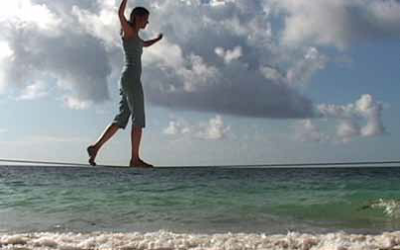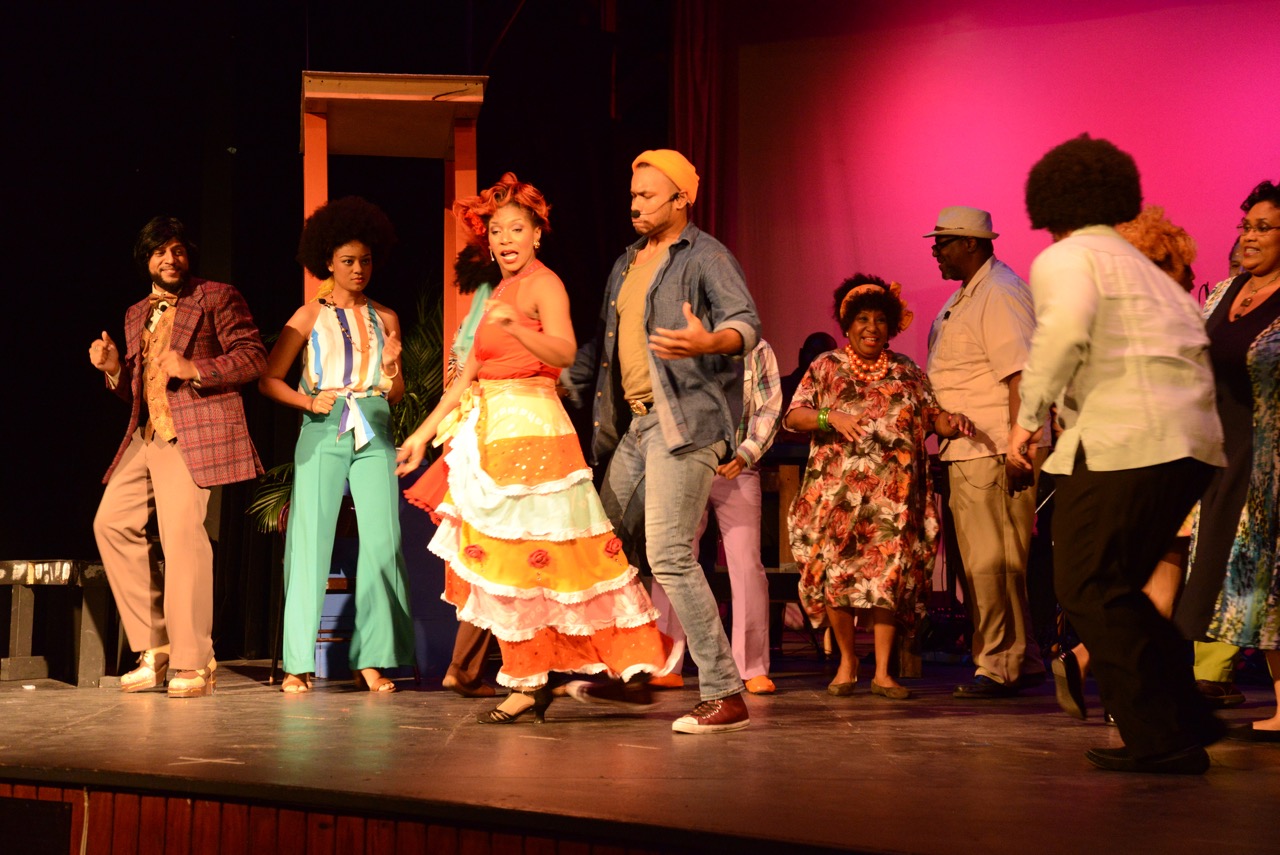
By Dr Ian Bethell-Bennett
Shakespeare in Paradise’s Nicolette Bethel and Phillip Burrows demonstrate their skill at bringing the 70s and 80s alive today with Eddie Minnis’ Der Real Ting, with a real flair for the time and linking then to now. Costume and design worked tremendously to create the feel of back then. The ironic paradoxes of creativity and the musical composer’s eye for critique and social commentary sync with vivacious energy of island time. The confluences of alcohol abuse and social and personal decay are experienced as Gregory Dean pricelessly crosses the stage as he scratched his arse on his way.
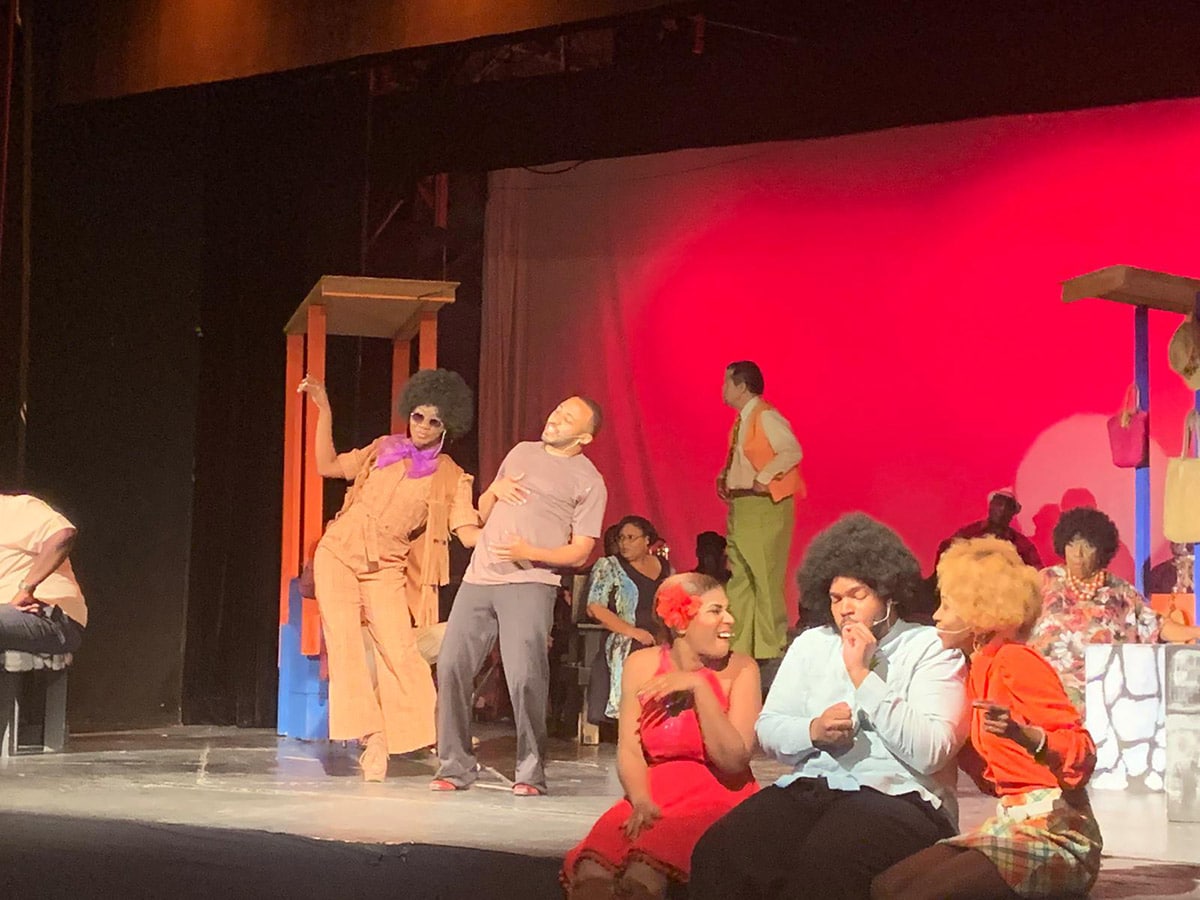
Cast from Der Real Ting, L-R: Vernal Adderley, Lyndee Bowe, Nicolette Archer, Dion Johnson (Mike), Quincy Parker, Contanza Adderley, Sasha Major, Anja Bowe. Image courtesy of Nicolette Bethel.
The Williams brothers are unbelievable in their charactured fullness, yet it all works so completely. The wayward brother come to good is well depicted and understood, yet not overdone. The parody is laughable and comic, but still extremely believable. The irony and paradox of time’s passage and the lack of change are all clear. Yet the play does not have a sad moment, because the music is invigorating and the cast expert at nonstop performance, the energy translates into the audience and the place is on fire. The lead female is fabulous in her embodiment of Carmen, who we love to love and love to hate. Yet, everyone has a story and every story has background. From smoking everything in sight to the tale of Fox Hill prison. Nothing has changed. Perhaps there are more drugs than there were before, with The Bahamas being famous for pharmaceuticals and psychedelics where paradise meets prison.
Art, especially music, I find, allows conversations to be had without any kind of stigma. While the violent lyrics of Eminem and Vybz Kartel as well as Movado speak to a particular early 21st-century masculine violence and misogyny, Eddie Minnis’ works allow a panoramic snapshot, moving across topics with a single genre. The music and lyrics coupled with the visual interpretations and the performance of gender on stage entertain the audience while really providing a social critique, although some might say subtle. I find the message clear, not overpowering, and funny, in its witness. The montage really brings life to the music and the music brings energy and enthusiasm as well as joy to the audience through the performance. The live band is an incredible addition to the work as it adds another dimension that canned music would not have reached. I think Burrows and Bethel saw this when they put the musical together as it could have ended up being a very different experience.
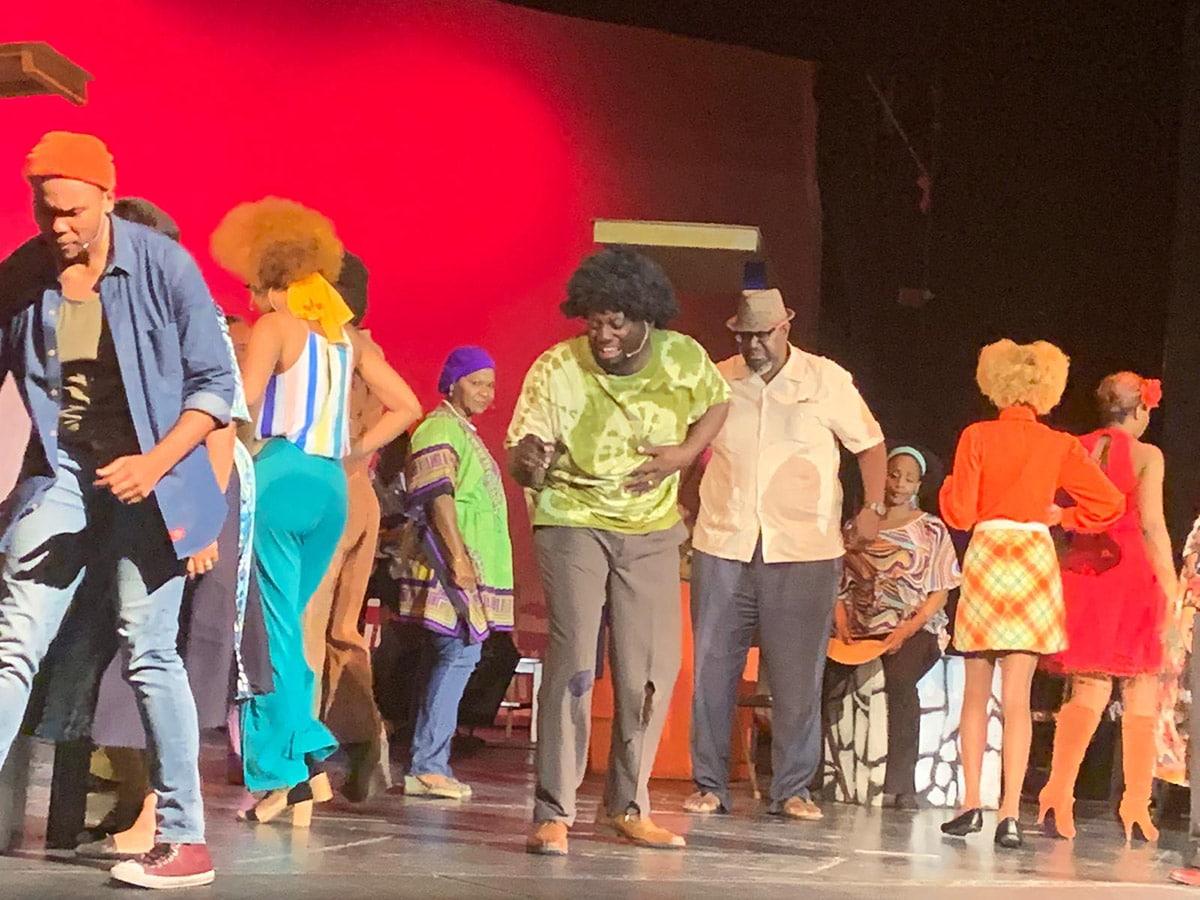
Cast from Der Real Ting, L-R Samantha Pratt, Osano Neely (Johnny), Fabienne Bailey-Brown, Anja Bowe, Gregory Deane, Ali Culmer, Sasha Major, Rose Barrett, and members of the band led by Fred Ferguson. Image courtesy of Nicolette Bethel.
I would like to explore this, though, as a more limited examination of Bahamian masculinity in relation to femininity and society. Ian Strachan’s I’s Man, 2013 and Juliette Storr’s So You Think You Ss Woman, Hey? 2017 all explore the constructs of Bahamian gender and gendered relations. The play grapples with representations of masculinity in Minnis’ work and the lyrical freedom that music seems to allow the work. I would even venture to add, though, that the work shows how much the envelope was being pushed in the arts back in the 70s and 80s. Since then, we seem to have been consumed by a progressive slide into religiosity that has precluded many conversations.
I was particularly impressed with the seamless intersection of the gendered view into the play without it becoming a focus of too much attention. It speaks to men being undermined by a system that emasculates while seemingly empowering them. This is clearly seen with alcohol because it is masculine to be able to handle one’s drink, and then the flipside is the rampant rate of alcoholism in the colonial islands.
It seems that while remaining very true to the art form, Bethel and Burrows also draw in the sociological side of the work; it is certainly there in the lyrics but the staged interactions and the nuanced readings are all present and show a wonderful depth of appreciation and a joyful, though hardly kind way of social decay and dysfunction. I find the work though far more joyful and light, funny and energetic resonates with Winston Saunders You Can Lead a Horse to Water, first performed in 1983, and staged as a part of the Shakespeare in Paradise Festival in 2016.
From womanising and masculine prowess to emasculation and failure and later resurrection bring the audience through the gamut of the feelings. Tough, as much as Carmen is an easily unlikable character, the audience ultimately identifies with her as her scorn and audaciousness or gall as she realises how trapped she is in this relationship. She then chooses to liberate herself, because the dog won’t liberate her. There is so much going on and it is so wonderfully underplayed that we simply move with the music and feel good. Even after the play ended, the first response is to enthusiastically greet the players because their energy has been contagious.
This is a fast-paced energetic 2019 rendering of Eddie Minnis’ song of the same name, Der Real Ting celebrates Minnis’ massive contribution to Bahamian popular music through an infusion of energy and vibes. From beginning to beyond the end the audience moves, sways, bobbs, laughs as music brings life to them and the cast perform a musical story of Bahamian life.
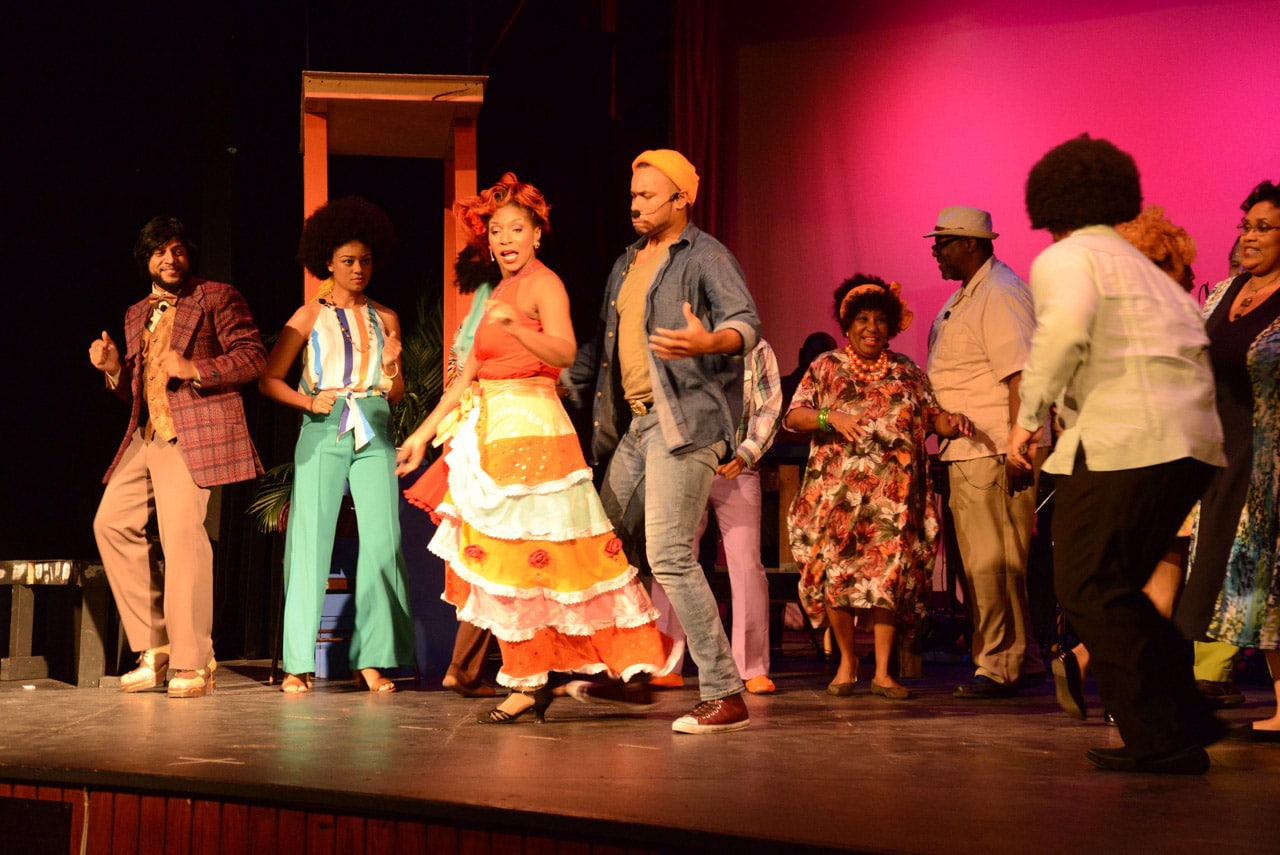
Image from the 2018 Shakespeare in Paradise Season. L-R Ezzra Thompson (Gregory Dean), The Magistrate (Tex Turnquest), Miss Bessie (Contanza Adderley), the brothers’ father Amos Williams (Qunicy Parker) politicians Clinton Roberts (Rossano Deal) and Joshua Hanna (Alfred A. Culmer). Images by Peter Ramsay
Incredibly well-scripted, and aptly cast, the musical, never ebbs. It is a full two hours of singing, dancing and high-energy enjoyment. Eddie Minnis must be one of the more influential cultural performers because of his many lyrics that capture essences and nuances of Bahamian life. From his songs Alcohol to Shot Gun Weddin’, the lyrics tell tales of island life and movement between city and out island. The picture of corruption serendipitously performed across the stage is comic as well as tragic. The tragedy is that the country is constantly undone by the uncaring, self-involved and egocentric, and, in many ways dimwitted performance of masculinity in the early postcolony. The joy and energy of the work, the skillful design and seamless narration make the work sing us into the paradise it critiques.
Perhaps the impact of the lyrics is due to having grown up on a diet of Eddie Minnis’ music, and not to forget his art. The live band was the welding together of life and history, time and image, as the montage of bodies and set, music and acting all work so tightly together that it would seem that the whole thing was supposed to be thus from before it was created.
